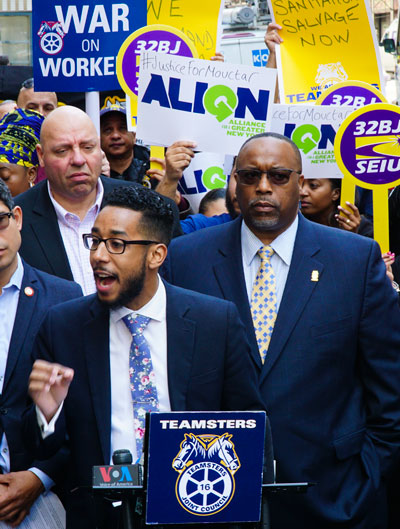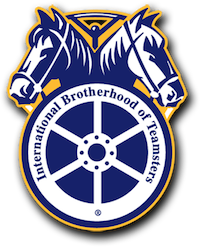
Council Members and Teamsters Rally for Suspension of Dangerous Carter and Reforms to Waste Industry
Today, Council Member Antonio Reynoso joined with fellow NYC Council colleagues, Teamsters Local 813, and advocacy organizations to call for legislative reforms to our City’s commercial waste industry and the suspension of Sanitation Salvage’s license, over the company’s reckless track record.
 This issue was brought to light in last Friday’s ProPublica article, which drew attention to the case of Mouctar Diallo, a 21-year-old immigrant from Guinea, who had been working off-the-books on a Sanitation Salvage truck for over a year. When he was run over by the truck he was working on in November 2017, police were originally told that Diallo was unknown to the company and he was reported to be a “crazed homeless person.” The driver who ran over Diallo continued to work for the company and then hit-and-killed 72–year-old Leo Clarke on April 27, 2018.
This issue was brought to light in last Friday’s ProPublica article, which drew attention to the case of Mouctar Diallo, a 21-year-old immigrant from Guinea, who had been working off-the-books on a Sanitation Salvage truck for over a year. When he was run over by the truck he was working on in November 2017, police were originally told that Diallo was unknown to the company and he was reported to be a “crazed homeless person.” The driver who ran over Diallo continued to work for the company and then hit-and-killed 72–year-old Leo Clarke on April 27, 2018.
The deaths of Mouctar Diallo and Leo Clark are horrific tragedies, yet they are not isolated events. The sad reality is that the story of Diallo and Clark is yet another example of the private carting industry’s rampant negligence. Since 2010 alone, the private carting industry has had 33 vehicular fatalities. In addition to the grave danger that the private carting industry poses to pedestrians and workers, it is inefficient and counterproductive towards our City’s environmental sustainability goals.
“Sanitation Salvage’s reckless disregard for workers’ safety, or even their basic humanity, is all too common in New York’s private sanitation industry,” said George Miranda, President of Teamsters Joint Council 16. “The Teamsters stand in solidarity with the workers at Sanitation Salvage who are fighting for safe jobs, and the Bronx families that are mourning Mouctar Diallo and Leo Clark. The Business Integrity Commission should suspend this company immediately and the Department of Sanitation should recommit itself to strong reforms of the industry to protect workers and the public.”
“Mouctar Diallo was like a lot of immigrants who come to this country, looking for a decent job and a better life,” said Council Member Carlos Menchaca. “Instead he was treated as expendable as the trash he was picking up. BIC should suspend Sanitation Salvage’s license immediately, but that is not enough. We need to recommit to the exclusive waste zone system that the Department of Sanitation announced two years ago. Watered-down reforms will not be enough to hold private carters accountable.”
“A young man lost his life working for Sanitation Salvage and it was covered up,” said Council Member Rafael Espinal. “Six months later, another New Yorker lost his life when he was run over by the company. The Business Integrity Commission should suspend the company’s license and show that in our city, worker safety and public safety are a priority.”
“The number of dangerous crashes involving private sanitation trucks has doubled in the last 24 months,” said Council Member Ben Kallos.”In a district as densely populated with narrow streets like mine, I worry every day about what could happen if a driver makes a mistake or a pedestrian forgets to look twice. The City needs to work toward making sure trucks obey slower speeds and enforce practices that are safer while making sure drivers are getting the help they need and are not fatigued on the job. Last but not least we need to find a way to get carting companies to outfit their trucks with safety in mind.”
“The tragic death of Mouctar Diallo and the subsequent cover-up have drawn attention to the insufficient oversight of private carting companies like Sanitation Salvage,” said Councilwoman Carlina Rivera. “Whether to promote better labor practices, street safety, or environmental sustainability, I support the Council exploring the most effective legislative tools to combat these issues of sanitation malfeasance and agency enforcement.”
“Since 2010, private sanitation trucks have been responsible for the tragic deaths of 33 people, including Mouctar Diallo and Leo Clark. This is beyond unacceptable– both for the industry’s employees and for pedestrians. To make matters worse, drivers work excessive shifts, and the trucks themselves fail safety inspections at four times the national average. The private sanitation industry is simply not up to New York City’s standards and needs to be better regulated, not just for everyone’s safety, but also to help us meet our sustainability goals. Pedestrian safety, sustainability, and fair labor practices are priorities for all New Yorkers, and the way we regulate this industry needs to reflect that,” said Council Member Helen Rosenthal (Manhattan, District 6).
The City’s Business Integrity Commission (BIC) was created to eliminate organized crime and other forms of corruption and criminality from the industries it regulates; this includes the sanitation industry. Yet the Commission has failed in regulating the private sanitation industry. For years, the private carting industry has engaged in dangerous behavior and BIC has consistently failed to take action.
“It’s appalling that these private waste companies can continue to operate in our backyard with no regard to public safety. Enough is enough –the Bronx and other overburdened communities deserve relief and the BIC needs to rein in the industry.” –Angela Tovar, THE POINT CDC
“We must commit to deep reform in the private sanitation industry that would provide the highest working standards in sanitation, ensure that workers and the public are safe, and demand robust regulations,” said Council Member Keith Powers. “The Business Integrity Commission (BIC) should start by evaluating companies that have operated illegally and in bad faith.”
The commercial waste system needs comprehensive and sweeping reforms to tackle its deeply rooted and widespread negligence. Council Member Antonio Reynoso is actively working with the Department of Sanitation to establish a commercial waste zone system. This system would address issues in the industry related to worker safety and labor standards, create efficiencies in truck routes, and improve fleet standards. Advocates are urging the department to commit to an exclusive commercial waste zone system that will protect workers and the public.
“We gather today in solidarity with the family of Mouctar Diallo,” said Sadatu Mamah-Trawill, Community Organizer at African Communities Together. “He was a hardworking man whose dignity, humanity, and life were taken away by Sanitation Salvage. We demand justice for Mouctar Diallo.”
“The tragic death of Mouctar Diallo and ensuing cover-up is a horrendous story, and it is not an isolated incident. The doubling of crashes and fatalities caused by private garbage trucks, the fires and building collapses at private transfer stations, and the widespread flouting of our environmental laws by private waste companies are reminders that this entire system needs to be reformed,” said Justin Wood, Director of Organizing and Strategic Research, New York Lawyers for the Public Interest (NYLPI) “We need justice for Mr. Diallo and his co-workers at Sanitation Salvage, and for a robust commercial waste zone system that will make this industry safer, more equitable, and more sustainable for workers and communities alike.”
“The private waste industry has cut corners on safety, diversion, and worker standards for decades. Environmental justice communities have dealt with the worst of these companies for far too long. It’s time for systemic reform with strong enforcement.” –Eddie Bautista NYC Environmental Justice Alliance (NYC-EJA)
In addition to the two recent fatalities, Sanitation Salvage has a history of putting trucks on the road that are unsafe to operate. Over the past two years, Sanitation Salvage’s trucks were inspected 12 times by government regulators and violations were found in every inspection. Ten of those inspections – 83% – had such severe violations that the trucks were ordered out of service. This is four-times greater than the national average failure rate of 21%.
“An industry that views lives as expendable does not deserve our respect,” said Council Member Stephen Levin. “It does not deserve our restraint. It does not deserve our patience. How can anyone look Mouctar Diallo’s family in the eye and say this is just the cost of doing business? The disregard for human life is appalling and it needs to come to an end. The time has come to rectify the pervasive problems in the carting industry and we at the Council will do everything we can to put an end to this nightmare. I’m proud to stand with Council Member Reynoso and my council colleagues in the fight to place people over profit.”
“Every day the commercial waste industry ignores basic safety measures, putting thousands of NYC workers and pedestrians’ lives at risk, and as the recent and horrifying story in Propublica shows, leading to tragic and unnecessary deaths,” said Council Member Brad Lander. “We desperately need reforms in this industry, and we need them now. I stand with City Council Sanitation Committee Chair Antonio Reynoso, Teamsters Local 813 and sanitation workers, the Transform Don’t Trash NYC Coalition and my Council colleagues in calling for long-overdue regulation of the private sanitation industry. Only then can we begin to find justice for Mouctar Diallo, Leo Clark and the thousands of sanitation workers facing unsafe conditions every single day.”
“I once again find myself calling for reforms to the private sanitation industry after another senseless tragedy. How many more of our City’s residents will need to die beneath the wheels of a private carter before the administration steps up and demands accountability? Today I am demanding that the Business Integrity Commission revoke Sanitation Salvage’s operating license,” said Council Member Antonio Reynoso. We cannot allow a company responsible for multiple deaths in a span of months to continue operation on our streets. But Sanitation Salvage is not just one bad apple – the entire orchard is rotten. The private sanitation industry can no longer be permitted to run amuck on our streets. I am therefore calling for comprehensive reform of the entire private sanitation industry through Commercial Waste Zoning. Today we put the industry on notice; we are putting an end to this Wild West environment once and for all.”
For far too long, our City’s residents have paid the price of an industry run amuck. It is time that the New York City Council takes action to regulate the private sanitation industry by passing comprehensive legislation.
